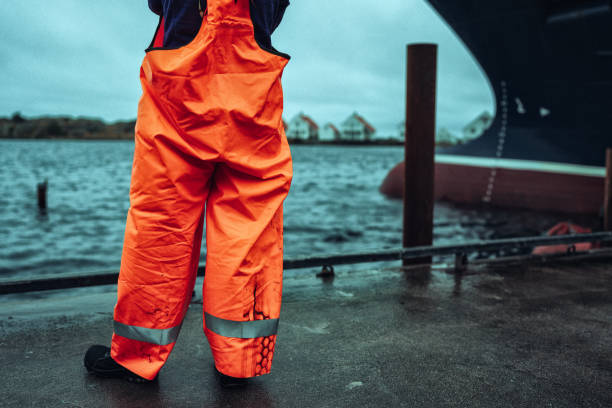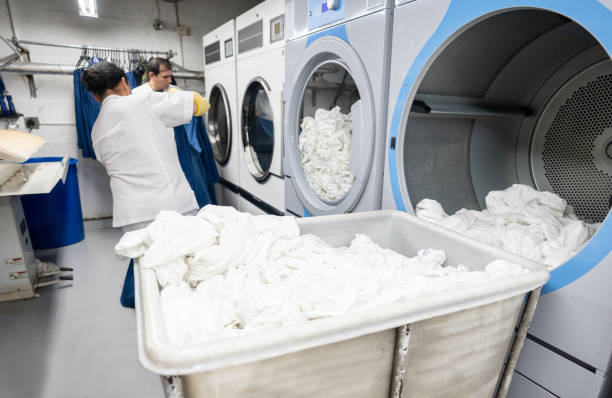Choosing the right fabric for workwear is important for durability, comfort, and safety. Industrial laundry fabric is designed to withstand frequent and rigorous washing cycles while maintaining its quality. In this article, we’ll look at what industrial laundry fabric is, how it’s made, and how to choose the best one for your needs.
What is Industrial Laundry Fabric?
Industrial laundry fabric is a special type of fabric designed to withstand the conditions of industrial washing processes. Unlike regular fabrics, industrial laundry fabrics are designed to maintain their strength, color, and overall integrity even after many wash cycles. This makes them ideal for use in environments where clothing and textiles are subject to heavy soiling and frequent washing.
Industrial laundry fabrics are used in a variety of industries, including healthcare, hospitality, and manufacturing. In healthcare, they’re used in uniforms, bed linens, and surgical gowns that need to be sanitized regularly. In hospitality, they’re used in table linens, napkins, and staff uniforms that need to look pristine despite constant use and cleaning. In manufacturing, they’re used in workwear that needs to endure tough conditions, such as exposure to oils, chemicals, and dirt.
Key Features of Industrial Laundry Fabrics
- Durability: The fabric can withstand the mechanical action of industrial washing machines, which are much harsher than domestic ones.
- Colorfastness: The fabric retains its color even after repeated exposure to strong detergents and high temperatures.
- Shrink Resistance: The fabric maintains its size and shape, avoiding shrinkage that could affect the fit and functionality of the garments.
- Stain Resistance: Special treatments make the fabric resistant to stains, so it looks clean and professional for longer.
How is Industrial Laundry Fabric Made?
The production of industrial laundry fabric involves several key steps, each designed to enhance the fabric’s performance under industrial laundering conditions.
1. Fiber Selection
The process starts with the selection of high-quality fibers. Common choices include cotton, polyester, and blends of these materials. Cotton provides comfort and breathability, while polyester adds strength and durability. Blends like polyester-cotton combine the best properties of both fibers.
2. Yarn Formation
The selected fibers are spun into yarns. The spinning process can vary, but it typically involves twisting the fibers together to create a strong and durable thread. The quality of the yarn is important because it directly affects the strength and durability of the final fabric.
3. Weaving or Knitting
The yarns are woven or knitted into fabric. Weaving creates a strong, stable fabric by interlacing the yarns in a specific pattern. Common weaves include plain weave, twill weave, and satin weave, each offering different characteristics. Knitting produces a more flexible and stretchy fabric. The choice between weaving and knitting depends on the intended use of the fabric.
4. Fabric Treatment
After the fabric is formed, it undergoes various treatments to enhance its performance. These treatments can include:
- Pre-Shrinking: To minimize shrinkage during washing, the fabric is often pre-shrunk through mechanical or chemical processes.
- Dyeing: The fabric is dyed using high-quality dyes that resist fading even under harsh washing conditions. In some cases, the dyeing process includes treatments to make the fabric resistant to bleach and other chemicals.
- Finishing: The fabric may receive additional finishing treatments to improve its properties. For example, it can be treated with stain-resistant, water-repellent, or flame-retardant chemicals. These finishes enhance the fabric’s functionality and suitability for specific applications.

How to Choose the Right Industrial Laundry Fabric for Workwear?
When you are selecting industrial laundry fabric for workwear, you need to consider the following factors:
1. Fabric Composition and Weight
You can choose from 100% cotton, polyester-cotton blends, polyester-cotton stretch, and cotton-nylon blends. The weight of the fabric can range from 150gsm to 300gsm, depending on the specific needs of the work environment.
2. Special Treatments
You need to determine if you need any special treatments such as waterproofing, antibacterial finishes, Teflon coating, or flame resistance. These treatments can enhance the fabric’s performance in specific applications.
3. Work Environment
You need to consider the actual usage environment of the workwear. For example, if the garments are going to be washed with disinfectants containing bleach, the fabric needs to be dyed with chlorine-resistant dyes to prevent color damage.
4. Cost
Industrial laundry fabrics are typically $0.15 to $0.30 per meter more expensive than regular dyed fabrics. However, their durability and longevity can result in long-term cost savings for your business by reducing the frequency of replacements.
Brands Supplying Industrial Laundry Fabric
Several brands are known for supplying high-quality industrial laundry fabrics, including:
- Milliken & Company: They are known for innovative textile solutions and durable fabrics.
- Carrington Textiles: They offer a range of fabrics designed for industrial laundry applications.
- Klopman International: They provide high-performance fabrics for workwear, focusing on durability and comfort.
- Prance : They are known for professional service and high-quality industrial laundry fabrics.
Workwear Brands Using Industrial Laundry Fabric
Many workwear brands use industrial laundry fabric in their products to ensure durability and comfort. Here are a few examples:
- Dickies Men’s Long Sleeve Work Shirt: They use industrial laundry fabric to ensure long-lasting performance.
- Carhartt Men’s Rugged Flex Rigby Dungaree Pant: Carhartt is known for rugged workwear, and they use these fabrics to enhance durability.
- Red Kap Men’s Industrial Work Pant: They provide industrial workwear that stands up to harsh conditions, thanks to high-quality laundry fabrics.
Types of Industrial Laundry Fabric
You can find industrial laundry fabric in various types, including:
- Polyester-Cotton Blends: These are known for durability and ease of care.
- 100% Cotton: This offers comfort and breathability but may require more maintenance.
- High-Performance Synthetics: These are designed for extreme durability and specific applications like chemical resistance.
Summary
Industrial laundry fabric is essential for workwear because it offers durability, comfort, and cost-efficiency. By understanding the benefits of industrial laundry fabric and how to choose the right fabric, you can make informed decisions as a workwear brand owner or fabric purchaser to ensure the longevity and performance of your products.

